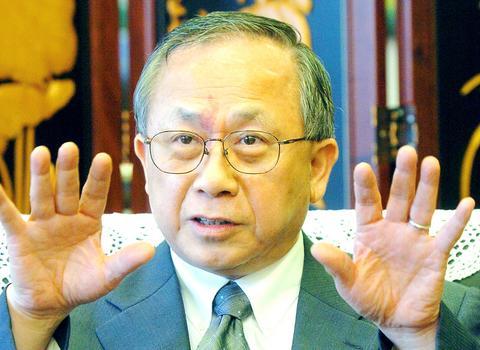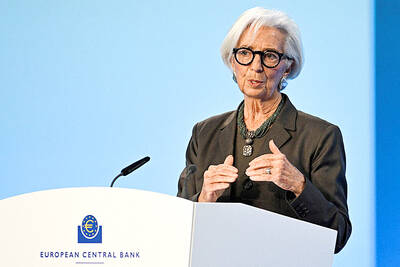Taipei Times: The Democratic Progressive Party government has vowed to reinforce its financial reforms to boost foreign investments in Taiwan's stock market [from 20 percent] to 30 percent. How would the government achieve this goal?
Hu Sheng-cheng (胡勝正): Financial reforms have been a top priority of President Chen Shui-bian's (陳水扁) administration, which has accomplished its first-phase goal, to turn around the distressed financial sector and clean up the nation's bad loans. According to government statistics, the nation's bad-loan ratio has dropped from a peak of 8.04 percent in the first quarter of 2001 [excluding loans under observation] to the current 3.8 percent.

PHOTO: GEORGE TSORNG, TAIPEI TIMES
Thus 2004 will mark a new year for the government to set new goals, including the creation of a profit-making environment to benefit the financial sector.
Ultimately, we want to develop Taiwan into a regional capital-raising hub, since our expatriate Taiwanese businesses have branched out globally. We also aim to turn the nation into a regional asset-management hub, since many foreign investors are interested in making investments here.
To achieve both goals, a further relaxation of controls on capital flow will be inevitable. This has motivated us to seek advice from the private sector on ways to cut red tape and facilitate a better financial-service and investment environment.
TT: Apart from measures to develop capital markets here, do you have any plans to address the importance of financial discipline and to monitor financial institutions' health?
Hu: To enhance the nation's capital markets, the government aims to facilitate a well-functioning financial supervisory system while adopting deregulatory policies to allow the private sector to prosper.
On July 1, the Cabinet-level Financial Supervisory Board (
The principle of corporate governance will also be emphasized to strengthen the sector's competitiveness while market mechanisms such as allowing hostile takeovers, as opposed to mergers and acquisitions, encourage its further consolidation.
TT: The private sector has long urged the government to relax cross-strait financial restrictions so that companies can branch into Chinese markets and gain market share in the greater China region. Will the government address this issue soon?
Hu: The Ministry of Finance has been considering a series of deregulatory measures to foster cross-strait financial development, which includes allowing China-based Taiwanese businesses to list on local stock markets. A freer flow of capital across the Taiwan Strait will also be taken into consideration, although some government agencies express concerns over the impact of this on national security.
I personally think businesses have a better understanding of where their money should go and should stay. What the government should do here is to respect the market mechanism and provide better information to enable businesses to make decisions, while adopting deregulatory policies to remove unnecessary restrictions.
TT: The economic recovery has turned solid, which should help the nation's economic growth rate [GDP] exceed 5 percent this year. But the economy still faces challenges and short-term disturbances, including skyrocketing oil prices, possible interest rate increases in both the US and China, and rising inflationary pressures in China after its measures to cool off excessive investment. How do you think those short-term factors will impact the local economy?
Hu: The government forecasts that this year's GDP will grow 5.41 percent, based on the precondition that crude oil is priced at US$32 per barrel. However, the nation's petroleum-related industries, which used to account for 37 percent of GDP, have less impact on the local economy since they now account for only 27 percent of GDP. The consumer price index (CPI) may rise by 0.04 percent for every 1 percent increase in oil prices.
Therefore, we may not feel the pain since our economy just emerged from deflationary worries and the nation's CPI may only increase slightly -- far less than a worrisome 3 percent jump. As for China's cooling-off measures to rein in its overheated economy, I think this will be positive for our local economy, as long as China manages a soft landing.
The pressures Taiwan faces to appreciate its currency will be greatly alleviated by this, despite the fact that one-third of Taiwan's exports go to China and that three-fourths of Taiwan's outbound investments are China-bound. However, many China-based businesses may have to reconsider their business deployment to diversify their risks, because China's WTO entry has brought in more foreign competition to the disadvantage of Taiwanese businesses there.
The government will soon formulate new policies to aggressively help China-based Taiwanese businesses expand elsewhere in Asia so as to diversify risks from doing business in China, where returns and risks are both high.
TT: What do you think of the recent controversy over Chinese authorities taking a hostile attitude against pro-independence Taiwanese businesses such as the Chi Mei Corp (奇美實業), the world's largest manufacturer of the plastic raw material ABS (acrylonitrile butadiene styrene)?
Hu: It has long been an issue that Taiwanese businesses can sometimes become hostages to cross-strait politics, although we're not sure yet that the recent trouble [Chi Mei encountered] is a case of this or not. But I don't think China is capable of economically isolating Taiwan. It has always been the local governments' job to compete for Taiwanese investments, and I don't think the central government can significantly or easily expand its influence at this level.
Also, as a WTO member, China has to impose nondiscriminatory policies on all businesses, including Taiwanese companies doing business there. China may have to pay a bigger-than-expected price if it attempts to intentionally harass Taiwanese businesses or to economically isolate Taiwan.
TT: In the short term, what will the government do to weather economic uncertainties and prepare for growth?
Hu: The government has been closely watching the possible impact from these economic uncertainties, which the local markets have previously overreacted to.
To minimize concerns over those short-term economic uncertainties, the government will continue its short-term economic stimulus policies, such as preferential home loans and the temporary employment scheme for public works.
The Cabinet's employment scheme, which is expected to come to an end on June 17, will be extended for another grace period of six months with an estimated budget of NT$7 billion to create 40,000 jobs.
In the long run, we'll strengthen the nation's infrastructure construction to beef up Taiwan's national competitiveness by launching the New 10 Major Infrastructure Projects to facilitate the transition from a labor-intensive to a knowledge-based and service-oriented economy.
The government will also continue economic and financial reforms, tax reforms and deregulation to improve the Taiwan investment environment.
New emerging industries for Taiwan to develop include the financial services, tourism and human services industries, which also help build a social welfare net for the aging society.
TT: To boost foreign investors' confidence in the economy, the president exchanged views with top executives of 17 foreign investment banks and brokerages last Monday. Did the government take any advice from those foreign investment bankers?
Hu: The Cabinet is still looking into the suggestions made by participants in this meeting, most of which will be considered as long as they are in accordance with international standards.
Many participants expressed interest in taking part in the nation's emerging business opportunities after the establishment of a domestic pension-fund scheme, and many urged the government to relax restrictions on the hedge fund.
In accordance with WTO principles, Taiwan will make every necessary effort to open up its financial markets and internationalize its capital markets.
TT: The American Chamber of Commerce in Taipei (AmCham) in its 2004 Taiwan White Paper called on the government to improve economic ties with China and facilitate direct transportation links as soon as possible. What is the government's official response?
Hu: I think many people in Taiwan have exaggerated the importance of direct cross-strait links, and I don't think the absence of them marginalizes the economy at all. On the contrary, some even argue that the local economy will be marginalized once the links are put in place.
I think Taiwan has done all it can to facilitate such links, but it takes two to tango. I sincerely hope that AmCham can also extend the same suggestion to the Chinese authorities, who have set a very difficult precondition that Taiwan must accept their "one China principle" to initiate talks on the three links. Taiwan will never accept the one China principle since it denies national sovereignty.

European Central Bank (ECB) President Christine Lagarde is expected to step down from her role before her eight-year term ends in October next year, the Financial Times reported. Lagarde wants to leave before the French presidential election in April next year, which would allow French President Emmanuel Macron and German Chancellor Friedrich Merz to find her replacement together, the report said, citing an unidentified person familiar with her thoughts on the matter. It is not clear yet when she might exit, the report said. “President Lagarde is totally focused on her mission and has not taken any decision regarding the end of

French President Emmanuel Macron told a global artificial intelligence (AI) summit in India yesterday he was determined to ensure safe oversight of the fast-evolving technology. The EU has led the way for global regulation with its Artificial Intelligence Act, which was adopted in 2024 and is coming into force in phases. “We are determined to continue to shape the rules of the game... with our allies such as India,” Macron said in New Delhi. “Europe is not blindly focused on regulation — Europe is a space for innovation and investment, but it is a safe space.” The AI Impact Summit is the fourth

AUSPICIOUS TIMING: Ostensibly looking to spike the guns of domestic rivals, ByteDance launched the upgrade to coincide with the Lunar New Year China’s ByteDance Ltd (字節跳動) has rolled out its Doubao 2.0 model, an upgrade of the country’s most widely used artificial-intelligence (AI) app, the company announced on Saturday. ByteDance is one of several Chinese firms hoping to generate overseas and domestic buzz around its new AI models during the Lunar New Year holiday, which began yesterday, when hundreds of millions of Chinese partake in family gatherings in their hometowns. The company, like rival Alibaba Group Holding Ltd (阿里巴巴), was caught off-guard by DeepSeek’s (深度求索) meteoric rise to global fame during last year’s Spring Festival, when Silicon Valley and investors worldwide were

Advanced Micro Devices Inc (AMD) is partnering with Tata Consultancy Services Ltd (TCS) to deploy the US chipmaker’s latest artificial intelligence (AI) data center technology in India, challenging Nvidia Corp in one of the world’s fastest-growing markets. AMD is to offer its Helios data center blueprint and work with TCS to support up to 200 megawatts of AI infrastructure capacity in India, the companies said in a statement on Monday. “AI adoption is accelerating from pilots to large-scale deployments, and that shift requires a new blueprint for compute infrastructure,” AMD chief executive officer Lisa Su (蘇姿丰) said in the statement. “Together with